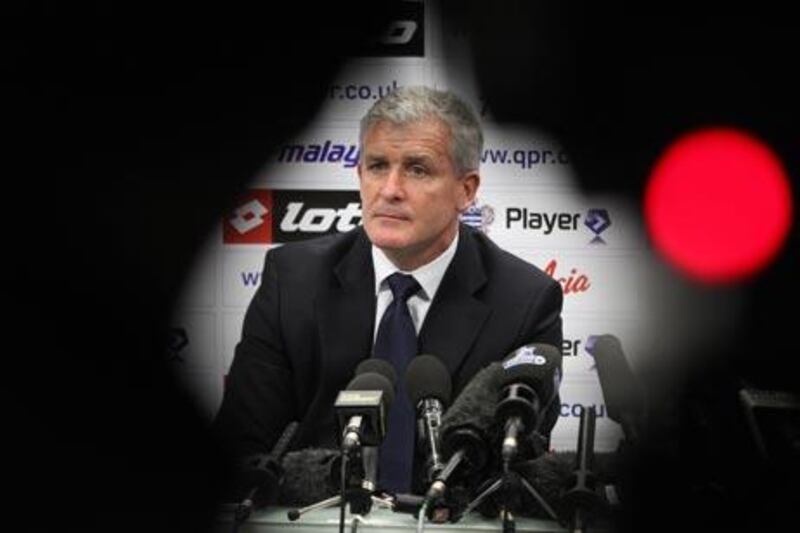Had things worked out differently, Mark Hughes might have been in the home dugout at the Sports Direct Arena today. Instead one of football's nomads begins life at a 10th club of his career as his reign at Queens Park Rangers starts in earnest.
But, four years ago, when Newcastle United had sacked Sam Allardyce, Hughes figured prominently in their thinking. They opted, erroneously, to hand Kevin Keegan a second spell in charge. Yet though Newcastle were relegated 16 months later, the subsequent four years have had a happier conclusion for United than Hughes.
Sitting comfortably in seventh place, aided by Alan Pardew's astute leadership, they have no reason to regret the one that got away. Hughes might.
Ambition - to use the word that crops up all too frequently in his rhetoric - led him from Blackburn Rovers, where he overachieved admirably, to Manchester City, where he floundered, and to quit Fulham last summer, accusing the club of not sharing his aspirations.
Ambition, he now claims, has taken him to QPR, below Fulham in the league, with a weaker squad, but the potential of more money to spend and, he claims, the chance to build something. Truth be told, it has been a chastening seven months of unemployment for the Welshman.
While there were optimistic hints Chelsea would be interested, the initial assumption was that he left Fulham for Aston Villa, but the Midlanders were swift to rule him out of the reckoning to take over from Gerard Houllier.
Then Plan B appeared to involve replacing his former Manchester United teammate Steve Bruce at Sunderland, but Martin O'Neill was preferred. QPR may be a case of third time lucky, but it leaves him with a reputation to rebuild.
It has been damaged by his association with Kia Joorabchian who, even by agents' standards, is distrusted. Hughes' defence of another Joorabchian client, Carlos Tevez, when the Argentine refused to warm up for Manchester City in their defeat to Bayern Munich drew criticism.
Sniping at his successor, Roberto Mancini, the day before City beat Manchester United 6-1, was misjudged and mistimed, only serving as a reminder that the Italian represents an upgrade on Hughes.
But, more pertinently, Hughes' career has not advanced in the four years since he attracted Newcastle's attention. His standing rests on his achievements with Wales and Blackburn, not on events at the Etihad Stadium or Craven Cottage.
Taking his country to the brink of qualification for Euro 2004 and Rovers to sixth place in the Premier League, one of three consecutive top-10 finishes that were surrounded by semi-final appearances, remain the concrete achievements on his CV.
That Fulham came eighth last season masks the reality they spent much of the campaign in the lower half. That City dismissed him when they did leaves his time in Manchester open to interpretation, with Hughes' version now differing from the majority viewpoint that Mancini is a manager of a different calibre.
So a restless soul has remained trapped in the position he was when 2008 began, looking for a bigger club. He may not have found one in QPR, but he has secured a bigger budget. And, as ambition seems to be a synonym for money in the football lexicon, that seems to be what he wanted.
Yet these are the twin paradoxes in Hughes' management: the talk of ambition ignores the reality that he has fared best in jobs where he has quietly over-delivered and the desire to spend more pays no heed to a record that suggests he is at his best with a limited budget.
At Ewood Park, he recruited Roque Santa Cruz, Benni McCarthy, David Bentley, Stephen Warnock, Ryan Nelsen and Christopher Samba for less than £10 million (Dh56.1m). The two central defenders remain at Blackburn, although Samba is linked with a January move, but the other quartet produced more than £40m when sold.
Yet that is partly because Hughes spent £17.5m to take Santa Cruz to City, as awful a deal then as it was inspired when he had first signed the Paraguayan two years earlier. He is now known for that extravagance as much as the earlier bargain hunting.
There is the expectation now that some of QPR owner Tony Fernandes' millions will be spent on City rejects and Joorabchian's clients and still more on Fulham and Blackburn players.
Not for the first time, football looks a numbers game. For Hughes, the task is to prove he does not have an inflated sense of his own worth. It must involve tangible success and lasting longer than he has at either City or Fulham.
And for a man with six former clubs in the Premier League, it starts at another of those he almost joined.






